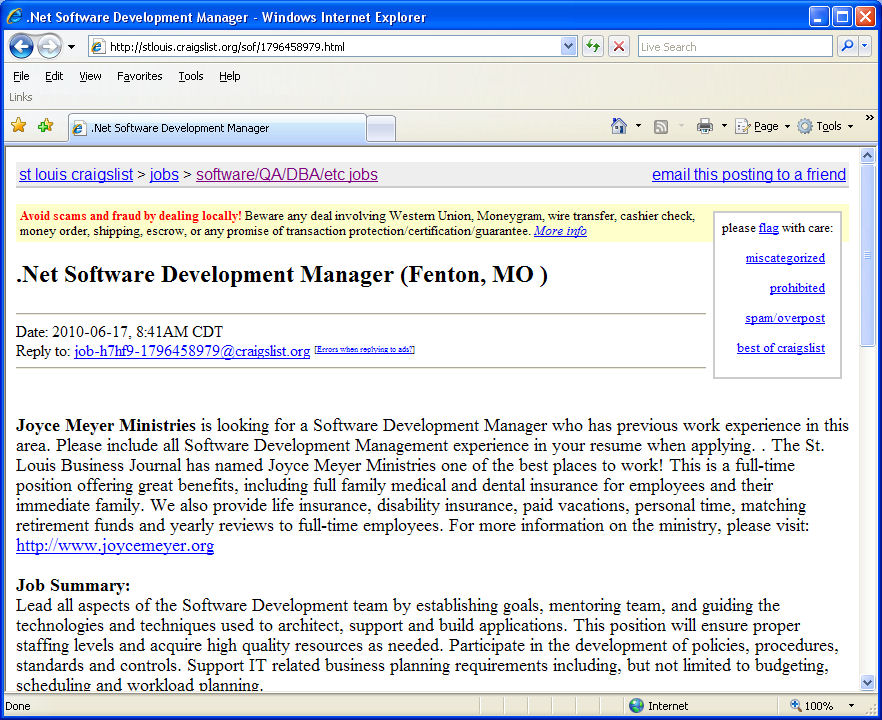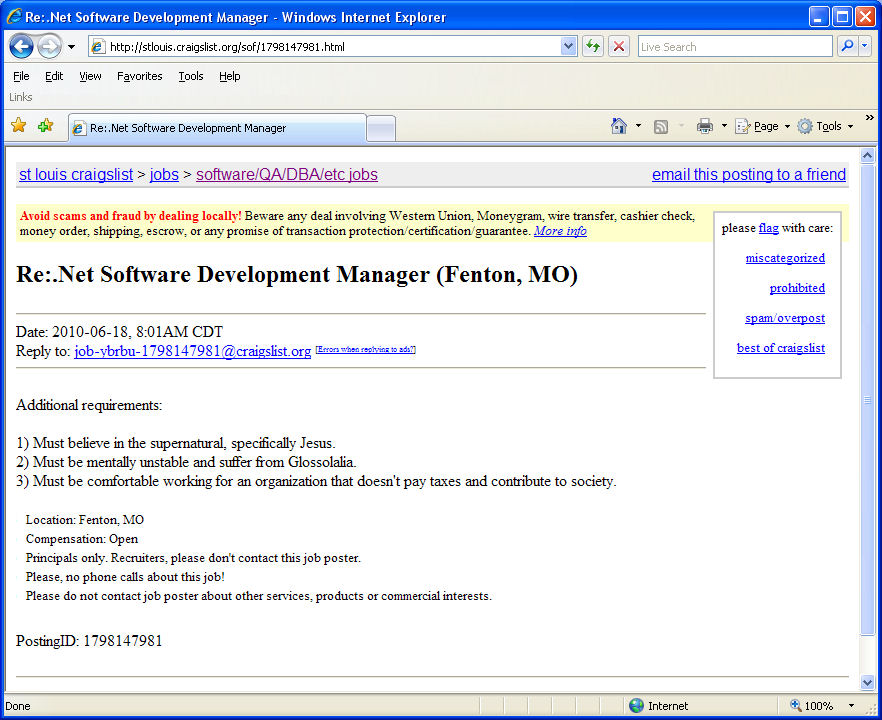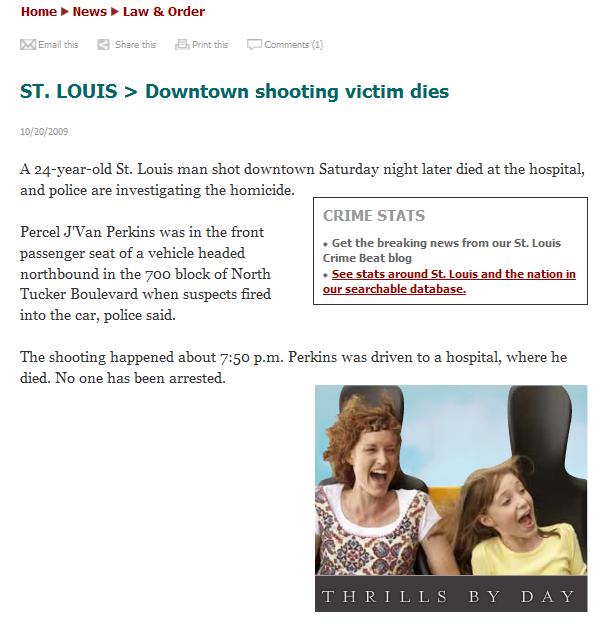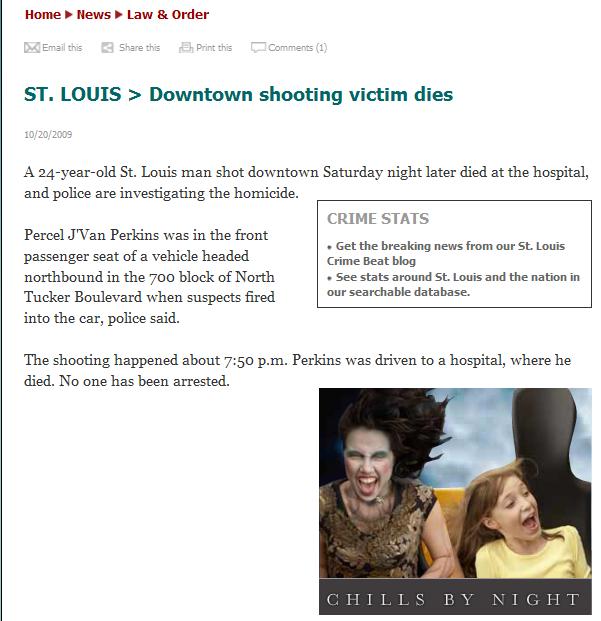An article in the St. Louis Post-Dispatch proves a useful lesson in municipal civics. The article’s title: St. Louis drops fee for pools, rec centers.
Lede:
Kids can play in city pools and gyms for free again this summer, thanks to a last-minute shift of tax money set aside for crime prevention.
Lesson 1: All Taxes Are Slush Funds
Aldermen have been trying to spend the money — $1 million a year from the public safety sales tax proposition passed by city voters two years ago — but they haven’t been able to agree on how. In the meantime, the money has largely been siphoned off to backfill other programs.
…
Proposition S had passed with 55 percent of the vote in February 2008. The half-cent sales tax increase was projected to raise $18 million a year to hire more police officers and replenish police and firefighter retirement systems.
A total of $1 million annually was also promised to city aldermen, to be used on crime prevention projects.
The city’s voters passed a tax to hire policemen. The city no doubt pitched it that way. It did not pitch that the annual salary of 10 or more policemen would be given to the aldermen as slush. But that’s how it worked out, isn’t it? Plus, these targeted taxes are always put on the ballot for popular (at least, popular enough to pass–55% might not count as popular in your high school), and the remaining regular revenue goes to other projects, programs, and payouts that would not garner 51% of voter support. Targeted taxes allow the city “leaders” to avoid prioritizing programs and maybe even cutting some when they need funding elsewhere.
Lesson 2: The Government can do things less efficiently than the private sector.
Then this summer, aldermen learned that a new $10-per-month fee was keeping kids out of the city’s seven recreation centers. Nearly 900 residents signed up for summer programs in June last year, said Gary Bess, director of city Parks, Recreation and Forestry. This June, only 600 enrolled, a drop of about one-third.
…
So, Friday, the committee voted unanimously to send $500,000 from the crime prevention budget to the city’s rec centers, to offset the new fees for children 18 and under. Bess, the parks director, said it would probably be enough to end the discounted $5-per-month fee for seniors, too.
So the city is spending an additional $500,000 to drop the fees for students and seniors. This is in addition to the $2,000,000 annual budget for the PRF Recreations division ($2,099,046 to be exact).
You want swimming pools and rec centers? The YMCA is lousy with them.
For $907,000, you could buy 900 household memberships, which would allow two parents and all their dependents to go to any YMCA in the country. That’s a net increase in served users over the 900 individuals this article seems to talk about.
There are fewer YMCAs in the city limits, 6, than the number of 9 rec centers and the 2 park pools the solution would replace, but in the metropolitan area, the YMCA has a total of 18 branches and the membership cards are good at any Y in the country. These city folk could hop into the Pat Jones YMCA here in Springfield and pump iron right next to me, for crying out loud. Some straw critics and maybe even a few real ones would argue that city residents wouldn’t be able to go to their corner rec center or pool, but with only 9+2 in the city, for most residents, going to the pool or the rec center would be a destination where you pack up into the car or hit the bus for an outing anyway.
Lesson 3: They Haven’t Passed The Law of Diminishing Returns
Spending $500,000 to get 300 people to return to the pools and recreation centers is spending $1667 each out of that raw cash dip even before you factor in the loss of revenue from the 600 residents who were actually paying in.
Maybe this is a corollary of the first lesson, though: since it’s all slush and it all must be spent, why not spend it foolishly?
(Sources: St. Louis YMCA rates and benefits and branches, St. Louis Parks, Recreation and Forestry centers and pools, and City of St. Louis FY 2010 Annual Operating Plan.)
And those, my friends, are the lessons you can learn about how government should not operate from one single piece of “good news” in the newspaper.







